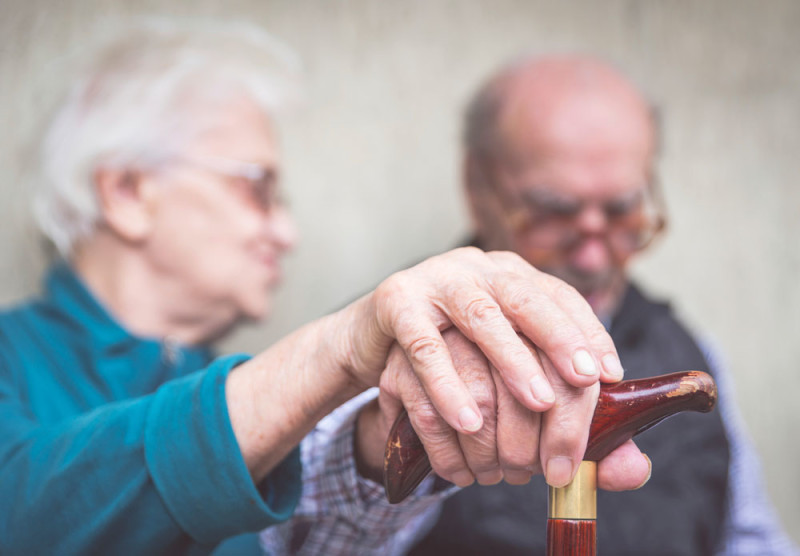With several million dollars in new gifts, momentum continues to grow for the Biggs Institute for Alzheimer and Neurodegenerative Diseases launched in September by the Health Science Center.
UT Health Science Center President William L. Henrich, M.D., MACP, announced recent gifts of $3 million from the Greehey Family Foundation, $2 million from the Valero Energy Foundation, $1 million from the Kronkosky Charitable Foundation and $1 million from the Baptist Health Foundation of San Antonio, along with $1 million from the J.M.R. Barker Foundation that is an accelerated payment toward a $5 million pledge for the institute.
The Greehey Foundation gift will further cutting-edge research into the causes of and treatment for Alzheimer’s disease. The Valero Foundation gift supports care for patients with Alzheimer’s and other neurodegenerative diseases, and provides important services for family members who are caregivers. The Kronkosky Foundation funding is for facilities and equipment and will establish a biorepository of tissue and blood specimens that is of critical importance to clinical trials. The Baptist Health Foundation gift endows a prestigious distinguished chair for the institute. The Barker Foundation gift is for recruitment of the new institute director that is now underway, Dr. Henrich said.
In supporting the Biggs Institute, these philanthropic organizations join other generous donors whose support has resulted in more than $23 million for endowments and more than $17 million from other gifts and support that will advance the success of the institute and its faculty and programs.
“The Biggs Institute will provide early diagnosis and then coordinated patient- and family-centered care for individuals with Alzheimer’s disease, other dementias and other neurodegenerative diseases through all disease stages,” said Francisco González-Scarano, M.D., dean of the School of Medicine and executive vice president for medical affairs of the Health Science Center.
Dr. González, a neurologist, said the institute will lead basic, translational and clinical research studies, including clinical trials that benefit patients both immediately and in the future. Educating the next generation of clinicians, scientists and health professionals is another focus, because they will lead innovation in the treatment and prevention of neurodegenerative diseases.
The institute honors the memory of Glenn Biggs, the San Antonio philanthropist who was the founding chairman of the Health Science Center Development Board. Mr. Biggs, who died last May, had a diagnosis of Alzheimer’s disease.
“Glenn Biggs was the inspiration for our vision to establish the Institute for Alzheimer and Neurodegenerative Diseases, and we are committed to the promise we made to him and so many other families to see this vision achieved,” Dr. Henrich said.
The Biggs Institute will initiate patient and caregiver support services and enhance public awareness and community engagement concerning these devastating diseases.
Bill Greehey serves as chairman of the Greehey Family Foundation, which was established in 2004. Since that time, the foundation has given well over $100 million to worthy charities in San Antonio and beyond. This includes more than $33 million in grants to the UT Health Science Center to fund the Greehey Children’s Cancer Research Institute; pediatric patient care for children and families in need; pediatric dentistry; scholarships and fellowships for the next generation of leaders in pediatrics; and the region’s only pediatric palliative care program. Mr. Greehey serves as chairman of the board of NuStar Energy L.P., and NuStar GP Holdings, LLC, both of which are based in San Antonio.
“This has been an effort our community has supported in an unprecedented way,” Dr. Henrich said. Other generous donors investing in the Biggs Institute and neuroscience research programs at the Health Science Center include the Zachry Foundation, the Robert J. Kleberg, Jr. and Helen C. Kleberg Foundation, USAA, the Klesse Foundation, the Nancy Smith Hurd Foundation, Keith Orme and Pat Vigeon Orme, Jack and Dolores Willome, Jimmie Thurmond and the Biggs family. “The community has invested in seeding a strong foundation that we have in the neurosciences, and they have positioned us to be very strategic in building a program that will support long term the tremendous need our community has for specialized care of the person with Alzheimer’s disease and other neurodegenerative disorders such as Parkinson’s and Huntington’s diseases,” Dr. Henrich said.
The Biggs Institute will capitalize on the success of the Barshop Institute for Longevity and Aging Studies, the world-renowned aging research center at the Health Science Center. Research of neurodegeneration is an emphasis of the Barshop Institute.
For example, Bess Frost, Ph.D., assistant professor of cellular and structural biology and newly recruited to the Barshop Institute, made recent headlines with her breakthrough discovery that a mesh-like scaffold called the lamin nucleoskeleton is disordered in the brain cells of Alzheimer’s patients, which can cause the death of the brain cells. This lamin dysfunction has not been found in other neurodegenerative diseases studied. The Barshop Institute was founded through a transformative gift from the late Sam Barshop and his wife Ann Barshop and their family.


